yeovil people
edmund damon
Draper and three-times Mayor of Yeovil
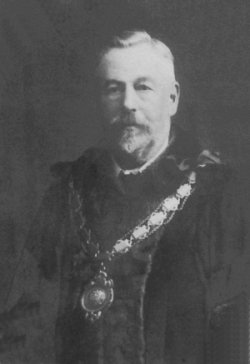 Edmund
Damon was born
in 1843 at
Fordington,
Dorset, the
third son of
Robert Damon and
his wife Jane.
Robert Damon was
a farmer of 160
acres
employing 6 men,
2 boys and 2
women at his
farm, Near Court
House, at
Fordington,
Dorset. Edmund had
two older
brothers,
Robert
and Henry, and
two younger
sisters, Nancy
and Ellen.
Edmund
Damon was born
in 1843 at
Fordington,
Dorset, the
third son of
Robert Damon and
his wife Jane.
Robert Damon was
a farmer of 160
acres
employing 6 men,
2 boys and 2
women at his
farm, Near Court
House, at
Fordington,
Dorset. Edmund had
two older
brothers,
Robert
and Henry, and
two younger
sisters, Nancy
and Ellen.
Edmund was educated at Watson's Private Academy at Dorchester but by 1861 he was living in the draper's shop of AnnaMaria Good at 55 High Street, Leamington, Hampshire. This was a large establishment, since apart from Mrs Good and her three daughters there were five drapers assistants and apprentices, including Edmund, and two domestic servants.
By the time of the 1871 census both Robert and Edmund had moved to Yeovil where they had set up, in partnership, a draper's business in the High Street. By this time Robert was aged 30 and Edmund was 27. Living with them at the draper's shop were five draper's assistants, a draper's apprentice and two general domestic servants.
For many years Edmund and his eldest brother Robert ran the Cooperative Outfitting Stores, later R&E Damon, Drapers, Clothiers, and Outfitters, in the Borough at 16 and 17 High Street, seen in the photographs and advertisement below. Before this the premises had been Frederick Cooper's outfitters in 1882 and in 1889 was the premises of the Co-operative Outfitting Stores. Before this, in the 1850s, it was the premises of James Curtis Snr and in the 1860s of his son, James Curtis Jnr. The site of their premises is where Superdrug is today. Robert managed the drapery side of the business and Edmund ran the clothing and outfitting side. Edmund's tailoring department was able to supply trousers for between 10/6d to 25/-, suits for between 40/- and 80/- and overcoats from 30/- to 75/- or in today's terms 55p to £1.25, £2 and £4 and £1.50 to £3.75. The business partnership was dissolved in January 1901 but Edmund carried on the business until he retired in 1908.
In the summer of 1880 Edmund married Anne Elisheba Warren, known as Annie, at Charleton Horethorne and in the 1881 census Edmund and Annie, together with their daughter Ethel and a domestic servant, were living in a house in Preston Road next door to the Somerset Inn. Edmund, albeit called Edward in the census, was listed as a draper.
The 1891 census listed Edmund as a 'draper and outfitter' at 16 High Street where his shop was sandwiched between that of James B Petter on one side and his brother Robert's on the other. Edmund and Annie were living above the shop with four children, a servant and two outfitter's shopmen. By 1901 little had changed, three daughters were living at home with Edmund and Annie as well as a domestic servant and a draper's assistant.
|
In the 1891 edition of 'Where to Buy' the Damon Brothers' business was given the following description -
Messrs.
R and E
Damon,
The district of South Somerset, of which Yeovil is the commercial centre, includes a wide area and a large and prosperous agricultural population, among which reside some of the leading county families. In such a district the business of silk mercer, draper and outfitter, is a very important one, and one of the most notable houses in this line is Messrs. R & E Damon's, Silk Mercers, Linen and Woollen Drapers, Hatters and Outfitters, of High Street. It is appropriate that such a leading house should have its seat in the principal centre of the town, and the extensive premises are in every way adapted for the purposes to which they are applied. There are two adjoining shops in High Street, forming two separate departments entirely distinct from each other. In one branch the silk mercery business is carried on, the spacious ware-rooms being fitted up with every modern convenience. The stock is extensive, and includes all the most fashionable dress materials in silk and other fabrics. The latest novelties are always on hand, Messrs. Damon having made special arrangements with the leading wholesale houses whereby they are enabled to offer the very latest fashions at the same moment as the London houses. A fine assortment of woollen, drapery and hosiery, of guaranteed quality and at moderate prices, is on hand. A competent staff of work people are engaged in dressmaking, the garments turned out being noted for elegance of style and perfect fit. The mourning department, under able management, is a speciality, and funerals are furnished throughout in a faultless manner and at the very minimum charge.
The
adjoining
shop,
No. 16,
High
Street,
is
devoted
exclusively
to male
outfitting,
and an
extensive
assortment
of men's
and
boys'
ready-made
clothing
is
always
on hand
in a
great
variety
of
materials.
Suits in
tweed
are
offered
at
exceedingly
moderate
figures,
and cord
trousers,
dust
coats,
covert
coats,
Jersey,
sailor
and
knickerbocker
suits
for
boys,
are
remarkable
for the
low
price as
well as
the
excellent
style in
which
they are
made up.
There is
also a
tailoring
department,
where
orders
are
promptly
carried
out by
first
class
cutters
and
workmen.
A very
large
assortment
of hats
and caps
by the
best
makers,
hosiery,
ties,
scarves,
collars,
cuffs,
gloves
and
shirts
of a
high
class,
and, in
fact,
general
outfitting
of every
kind, is
on hand.
Throughout
the
whole
business
the
proprietors
adopt
every
means to
ensure
the
complete
satisfaction
of
customers,
and both
in
quality
and
price
their
goods
can bear
comparison
with any
offered
to the
public
in this
district
or
elsewhere.
The firm
have
been
established
for 25
years,
and have
gained a
wide and
permanent
connection
in
Yeovil
and the
counties
of
Somerset
and
Dorset. |
Edmund was a Freemason and was initiated into Yeovil's Lodge of Brotherly Love on 12 February 1908 - the same evening as Lindsay Denner. He served as Worshipful Master of the Lodge in 1912.
By the time of the 1911 census Edmund was recording his occupation as 'retired draper ', and was living at Summerlands, Preston road, with Annie, his three unmarried daughters and a domestic servant.
Both Robert and Edmund served as Captains of the Yeovil Volunteer Fire Brigade. Robert died in 1905 and in 1906 Edmund, always keenly interested in local affairs, was elected to serve on the Town Council. He served three terms as mayor of Yeovil, from 1909 until 1911 and again from 1916 to 1917 following the death of Norman Buchanan. In 1917 Edmund proposed that a war memorial be erected to honour the many Yeovilians who died in the First World War.
Edmund Damon died on 8 November 1921. His estate was left to his widow Annie, unmarried daughter Gytha, Frank Skevington (civil servant) and Percy Francis Warren (architect). His estate was valued at £11,086 6d 9d (about £460,000 in 2017's value).

Edmund Damon's
signature on the
1911 census
gallery
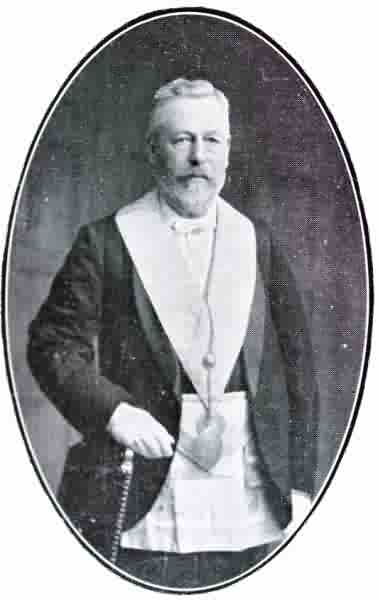
From my
collection
Edmund Damon photographed in Masonic regalia in 1910.
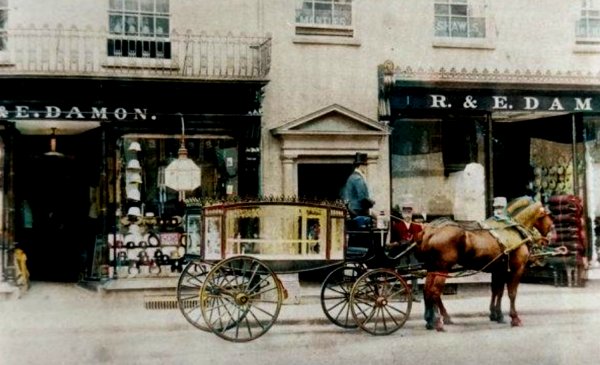
The Damon Brothers' store in High Street. This colourised photograph was taken around 1900 and the business partnership between the two brothers was dissolved in January 1901. Edmund ran the clothiers and outfitters at left (and clearly doing a nice line in pith helmets) while his brother Robert ran the drapery and haberdashery at right.
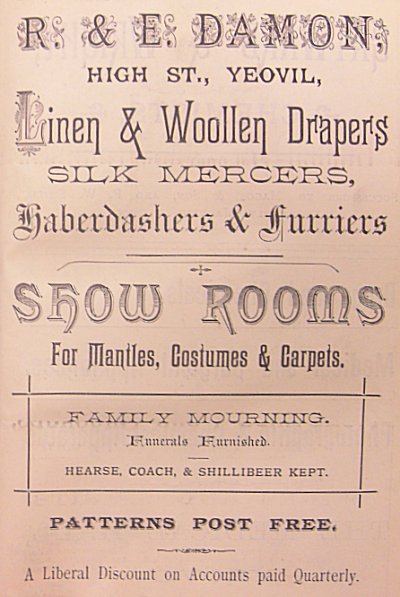
The Damon Brothers' advertisement in Whitby's Yeovil Almanack Advertiser of 1892.
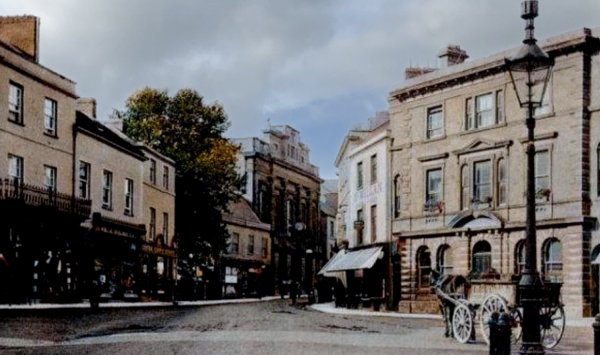
From my
collection
This colourised postcard of the Borough dates to about 1905 and shows the premises of the Damon Brothers as the first two of the three buildings at left.
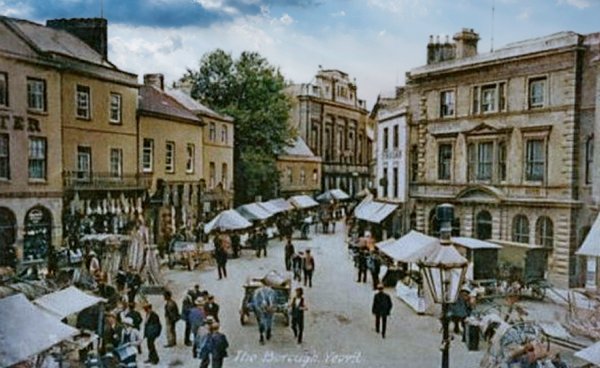
From my
collection. This
colourised photograph
features in my
book 'Secret Yeovil'.
A postcard of about 1905 (this one was posted in 1911) showing the Town Hall beyond the weekly market in the Borough that extended along High Street. Damon Brothers' stores are festooned with hats and coats.
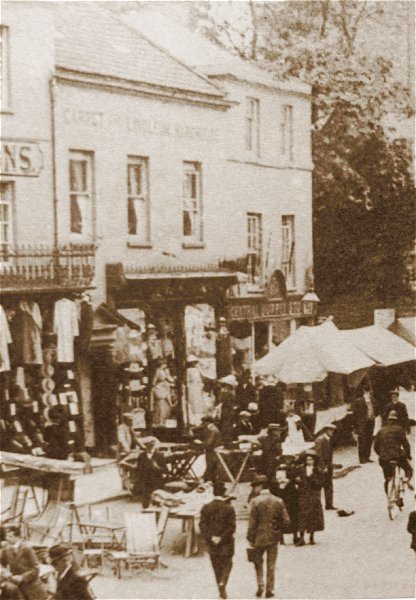
A closer view of the Damon brothers' store (well, half of it) on a busy market day around 1908, the year Edmund retired. By this time his brother Robert had been dead for three years.
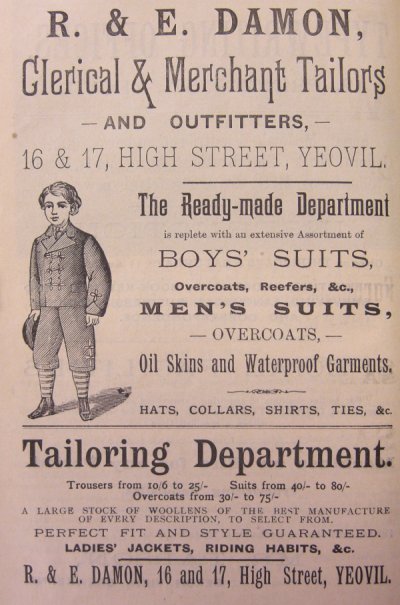
A Damon Brothers advertisement from Whitby's Yeovil Almanack Advertiser of 1897.